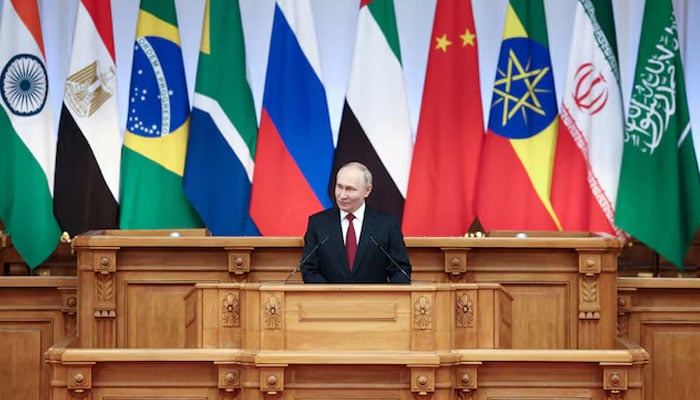
- Russian President Putin will receive delegations from 36 countries.
- The share of BRICS countries in global GDP is expected to rise to 37% in the coming years.
- Putin is scheduled to meet Indian Prime Minister Modi and Chinese President Xi on Tuesday.
Russian President Vladimir Putin expressed his readiness to welcome world leaders and organizations to the Brazil-Russia-India-China-South Africa (BRICS) 2024 Summit in the Russian city of Kazan on Tuesday.
The Russian president will receive delegations from 36 countries – 22 of which are represented by heads of state – and six international organizations in Kazan as they attend the “largest foreign policy events ever” in Russia, according to the Kremlin.
The acronym BRIC was coined in 2001 by Goldman Sachs’s then-chief economist, Jim O’Neill, in a paper that highlighted the enormous growth potential of Brazil, Russia, India and China in this century.
Russia, India and China began meeting more formally, eventually adding Brazil, then South Africa, Egypt, Ethiopia, Iran and the United Arab Emirates. Saudi Arabia has not yet officially joined.
Putin told reporters from the BRICS countries that “the BRICS does not position itself in opposition to anyone” and that the shift in global growth engines was just a fact.
“This is an alliance of countries working together on the basis of common values, a common vision for development, and most importantly, the principle of taking each other’s interests into consideration,” he said.
The BRICS share of global GDP is expected to rise to 37% by the end of this decade, while the share of the G7 major Western economies will fall to about 28% from 30% this year, according to data from the International Monetary Fund.
Russia is seeking to persuade the BRICS countries to build an alternative platform for international payments that is immune to Western sanctions.
But divisions abound within the BRICS group.
China and India, the largest buyers of Russian oil, face difficult relations, while there is little love lost between Arab countries and Iran.
Who will attend BRICS 2024?
Putin will meet with Indian Prime Minister Narendra Modi and Chinese President Xi Jinping on Tuesday, and with Iranian President Masoud Pezeshkian and Turkish President Recep Tayyip Erdogan on Wednesday.
According to Kremlin foreign policy aide Yuri Ushakov, the three-day summit will conclude with Putin holding a press conference on Thursday.
However, Brazilian President Luiz Inacio Lula da Silva canceled his trip following medical advice to temporarily avoid long trips after suffering a head injury at home that caused a minor brain bleed.
The shadow of the Ukrainian war hangs over Putin
The BRICS summit comes as global finance ministers meet in Washington amid war in the Middle East and Ukraine, a faltering Chinese economy and fears that the US presidential election could spark new trade battles.
Putin, who has ordered troops to be sent to Ukraine in 2022, was subjected to questions from BRICS reporters about the prospects for a ceasefire in Ukraine.
His short answer was that Moscow would not trade the four regions in eastern Ukraine that it says are now part of Russia, even though parts of them remain outside its control, and that it wants to take its long-term security interests into account. Account in Europe.
Two Russian sources said that although there is increasing talk in Moscow about a possible ceasefire agreement, there is nothing concrete yet, and that the world is awaiting the outcome of the presidential elections scheduled to be held in the United States on November 5.
In addition, on the eve of the BRICS summit, Putin met with UAE President Sheikh Mohammed bin Zayed Al Nahyan for informal talks that lasted until midnight at his residence in Novo Ogaryovo outside Moscow.
Putin praised both Sheikh Mohammed and Saudi Crown Prince Mohammed bin Salman, who will not attend the summit in Kazan, for their mediation efforts regarding Ukraine.
Sheikh Mohammed told Putin, “I assure you that we will continue to work in this direction.” He added, “We are ready to make any effort to resolve the crises in a way that serves peace and is in the interest of both sides.”
